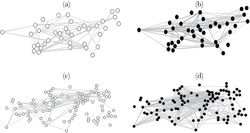Social networks, fighting and sperm competition
|
In many animals, males compete for matings (e.g. fighting for access to females) and then, if they manage to mate, their sperm have to compete with the sperm of other males that have already mated to the same female. This post-copulatory ‘sperm competition’ is particularly common in insects where females store sperm from several males in a specialised organ inside their bodies, and use it to fertilise eggs as they lay them.
|
One question is the extent to which pre-mating competition and sperm competition are related – can males avoid sperm competition by monopolising a female? Or do males specialise in one form of competition, for instance only getting occasional matings, but when they do making sure they inseminate so many sperm that they father a lot of offspring.
We studied competitions between male wild crickets by building social networks of interactions. We linked males in a social network if they physically fought each other, and we also built a social network where males were linked if they were in sperm competition with each other because they’d both mated to the same female.
We found that males that had more fights were more likely to meet in sperm competition so males couldn't use fighting as a way of avoiding sperm competition. This suggests that evolution won’t favour specialists in one of the two types of competition. We also found that the individuals that fought a lot of different rivals were also in sperm competition with a lot of different rivals, which may indicate that male condition or "quality" is key for success in sexual competition.
However, the bad news for the males that are doing lots of fighting and getting lots of matings is that we found that more promiscuous males were more likely to mate with more promiscuous females, where their share of paternity will tend to be lower.
Download our paper on this work here
We studied competitions between male wild crickets by building social networks of interactions. We linked males in a social network if they physically fought each other, and we also built a social network where males were linked if they were in sperm competition with each other because they’d both mated to the same female.
We found that males that had more fights were more likely to meet in sperm competition so males couldn't use fighting as a way of avoiding sperm competition. This suggests that evolution won’t favour specialists in one of the two types of competition. We also found that the individuals that fought a lot of different rivals were also in sperm competition with a lot of different rivals, which may indicate that male condition or "quality" is key for success in sexual competition.
However, the bad news for the males that are doing lots of fighting and getting lots of matings is that we found that more promiscuous males were more likely to mate with more promiscuous females, where their share of paternity will tend to be lower.
Download our paper on this work here


